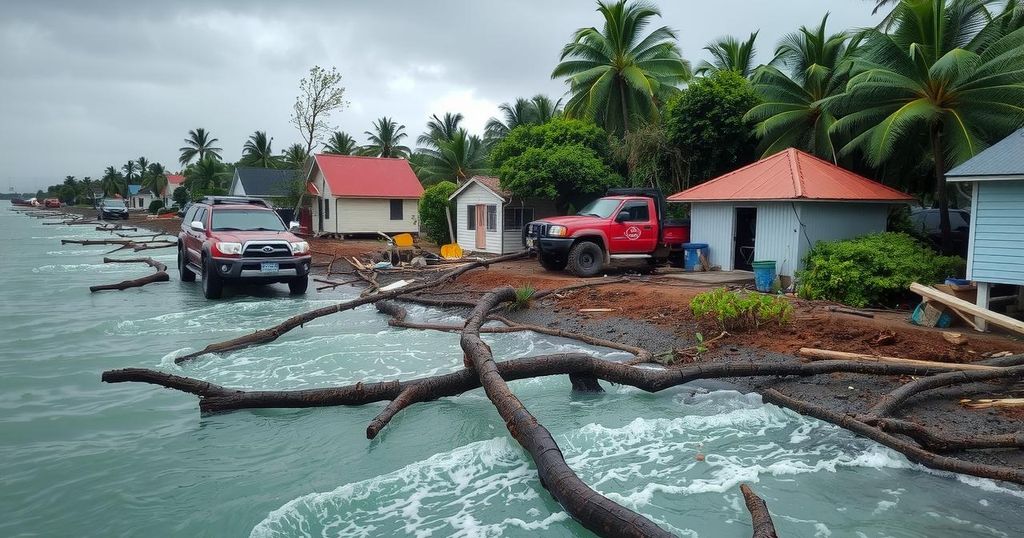France Races to Provide Aid in Mayotte After Cyclone Chido’s Destruction
France is sending military aid to Mayotte following Cyclone Chido, which struck over the weekend. Hundreds, or possibly thousands, are feared dead, with only 14 fatalities officially reported. The cyclone caused severe infrastructure damage, and over 800 additional responders will assist in recovery. The disaster highlights Mayotte’s vulnerability and the pressing need for effective emergency management in cyclone-prone areas.
On Monday, France is mobilizing extensive aid to its overseas territory of Mayotte in the Indian Ocean, which has been devastated by Cyclone Chido. This powerful cyclone struck on Saturday, causing catastrophic damage and leading to numerous feared casualties. Rescue teams, medical personnel, and significant supplies are en route from mainland France and the nearby territory of Reunion. French officials anticipate the arrival of over 800 additional personnel in the coming days to assist in recovery efforts across the impacted area.
Current estimates regarding fatalities suggest that as many as thousands of individuals may have perished, although the official count stands at 14. The Prefect of Mayotte, François-Xavier Bieuville, indicated that the true toll could range from several hundred to potentially thousands. The cyclone’s impact has been particularly severe in impoverished neighborhoods, where makeshift housing has been severely compromised. Consequently, local authorities are encountering challenges in assessing the total number of victims due to the urgency of traditional burial practices and the presence of undocumented migrants.
French media reported on Monday that Interior Minister Bruno Retailleau had arrived in Mamoudzou, the capital, to oversee the response efforts. He remarked, “It will take days and days to establish the human toll.” The destruction from Chido is extensive; entire neighborhoods have been razed, while critical infrastructure has incurred significant damage, including the main airport and hospital. Given the damage to the airport control tower, only military aircraft can provide assistance.
Cyclone Chido afflicted not only Mayotte but also nearby islands such as Comoros and Madagascar, moving further into southern Africa and making landfall in Mozambique. As the cyclone weakened, vulnerabilities in these regions necessitated preparations for possible evacuation due to anticipated flooding. This year marks a continuation of a worrying trend, as southern Africa has faced multiple severe cyclones in recent years, raising concerns for the ongoing cyclone season.
Overall, the situation in Mayotte is dire, with French authorities working diligently to provide aid amidst the chaos. The response will certainly take considerable time and resources to address the loss of life and necessary rebuilding in the aftermath of Cyclone Chido.
Cyclone Chido represents one of the most significant meteorological events to impact Mayotte, an overseas French territory characterized by extreme economic hardship. The cyclone, classified as a category 4 storm, produced winds exceeding 220 kilometers per hour and inflicted unparalleled destruction. Mayotte is home to a diverse population of approximately 300,000 residents, many of whom live in informal settlements that lack proper infrastructure. Consequently, the aftermath of natural disasters poses unique challenges to recovery and aid efforts, particularly in densely populated slum environments. The increased susceptibility of Mayotte to such natural disasters is underscored by its geographic location in the Indian Ocean’s cyclone-prone region, particularly between December and March. As climate-related phenomena become increasingly prevalent, the local government must confront the complex interplay of poverty, migration, and environmental vulnerability. Reports of inundated areas and lost communication infrastructure further complicate recovery, as first responders work tirelessly to locate and assist those affected. The broader implications of Cyclone Chido extend beyond Mayotte, impacting neighboring regions in southern Africa that are already grappling with economic hardships and limited healthcare resources, prompting regional aid initiatives.
In conclusion, the devastation wrought by Cyclone Chido on Mayotte has prompted urgent humanitarian aid from France. While initial reports of casualties are alarming, the true scale of the tragedy remains uncertain. Efforts continue to mobilize resources and personnel to assist in recovery, with the situation highlighting the ongoing vulnerabilities of Mayotte and surrounding regions to extreme weather events. As the cyclone threat extends to southern Africa, affected nations prepare for further challenges in the aftermath of this natural disaster, underscoring the necessity for robust disaster response frameworks.
Original Source: ny1.com




Post Comment